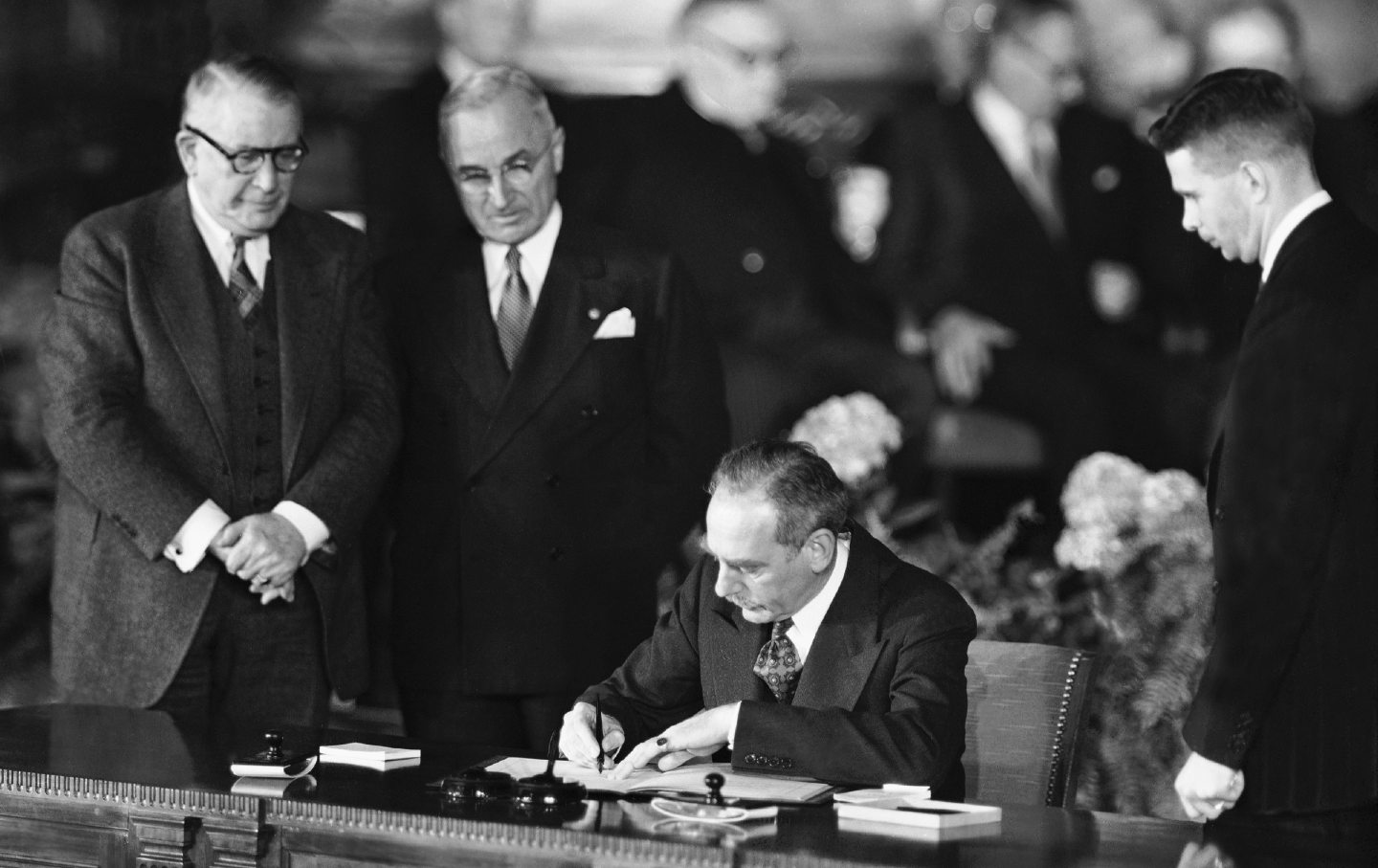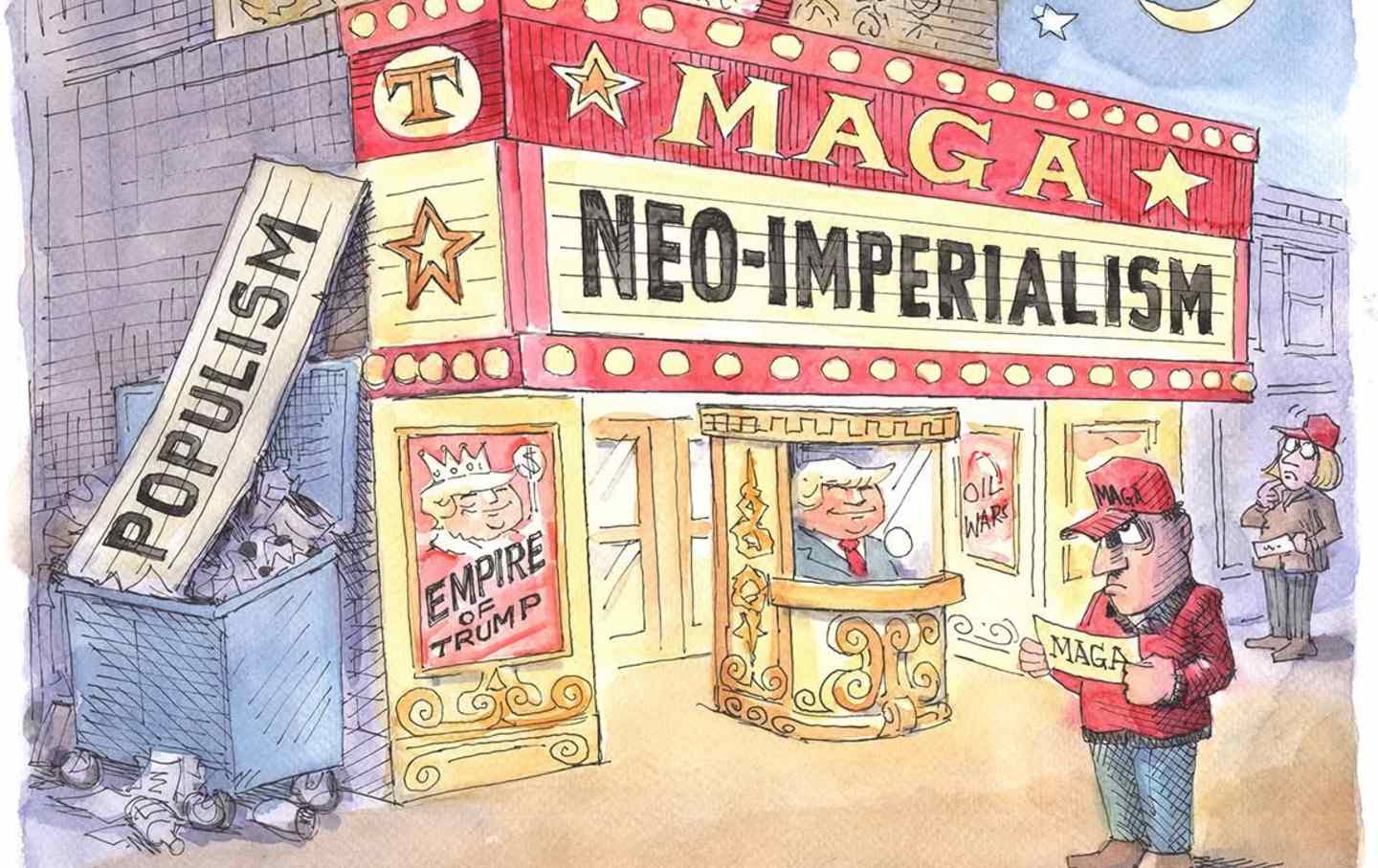NATO’s 75th Anniversary Is a Good Time to Reflect on Lost Opportunities That Still Haunt Us Today
The broken promises that led to war.

If diplomacy can pave the path to peace, then broken diplomatic promises can lead to war. Since the hopeful end of the Cold War, four key promises were made by the West. Each of them was intended to pave the path to the new and stable era of peace, but each of them was broken by the West and served instead to pave the path to war in Ukraine.
The 75th anniversary of the founding of NATO is a good time to reflect not only on its accomplishments but also on the lost opportunities that still haunt us today.
First Broken Promise: “Not One Inch to the East”
The war in Ukraine is being fought in part over Ukraine’s and Russia’s need for security guarantees. But that concern was not created out of nothing in 2022.
On February 9, 1990, US Secretary of State James Baker famously offered Gorbachev a choice: either a united but independent Germany outside of NATO or a united Germany connected to NATO “but with the guarantee that NATO’s jurisdiction or troops will not spread east of the present boundary.” Baker later disavowed these words, saying it was merely a hypothetical question, but declassified documents refute Baker by adding his next statement. After Gorbachev replied, “It goes without saying that a broadening of the NATO zone is not acceptable,” Baker responded, “We agree with that.”
Meeting with Soviet Minister of Foreign Affairs Eduard Shevardnadze on the same day, Baker even refers to “iron-clad guarantees that NATO’s jurisdiction or forces would not move eastward.” Later that day, Baker famously told Gorbachev and Shevardnadze, “If we maintain a presence in a Germany that is a part of NATO, there would be no extension of NATO’s jurisdiction for forces of NATO one inch to the east.”
Simultaneously, German officials pointedly told Shevardnadze, “For us it is clear: NATO will not extend itself to the East.” On February 2, standing beside Baker at a press conference, German Foreign Minister Hans Dietrich Genscher announced that he and Baker “were in full agreement that there is no intention to extend the NATO area of defense and the security toward the East. This holds true not only for GDR…but that holds true for all the other Eastern countries…whatever happens within the Warsaw Pact.” On May 17, 1990, NATO General Secretary Manfred Wörner called this a “firm security guarantee” for the USSR.
But the West soon broke that promise. Despite signing the NATO-Russia Founding Act on Mutual Relations in May 1997, pledging to “build together a lasting and inclusive peace in the Euro-Atlantic area on the principles of democracy and cooperative security,” the Clinton administration had already decided two years earlier in 1995 to extend NATO eastward. In 1999, NATO expanded eastward to Poland, Hungary, and the Czech Republic. In 2004, it added Bulgaria, Romania, Slovakia, Slovenia, Estonia, Latvia, and Lithuania. In 2009, Croatia and Albania joined, followed by Montenegro in 2017, and North Macedonia in 2020.
The West’s insistence that NATO continue its “open door” policy toward Ukraine and Georgia led directly to Russia’s demand on December 17, 2021, that the door be closed and that mutual security guarantees that included Russia be developed instead, or Russia would respond by “military-technical means.”
Second Broken Promise: Ukrainian Neutrality
But it was not only NATO that promised to stay out of Ukraine. It was also Ukraine that promised to stay out of NATO. Its non-alignment was enshrined in the foundational documents of the independent state of Ukraine.
Article IX of the 1990 Declaration of State Sovereignty of Ukraine states that Ukraine “solemnly declares its intention of becoming a permanently neutral state that does not participate in military blocs.” That promise was repeated in Ukraine’s 1996 Constitution, which committed Ukraine to neutrality and prohibited it from joining any military alliance. But in 2019, President Petro Poroshenko amended the Ukrainian Constitution, committing Ukraine to the “strategic course” of NATO and EU membership.
Given NATO’s past behavior, this was viewed as a direct threat by Russia. When asked in 2023 if Russia still recognizes the sovereignty of Ukraine, Foreign Minister Sergei Lavrov answered, “We recognized the sovereignty of Ukraine back in 1991 on the basis of the Declaration of Independence, which Ukraine adopted when it withdrew from the Soviet Union.… One of the main points for [Russia] in the declaration was that Ukraine would be a non-bloc non-alliance country; it would not join any military alliances…. In that version, on those conditions, we support Ukraine’s territorial integrity.”
Third Broken Promise: Indivisible Security
In 1999, the heads of state of the Organization for Security and Co-operation in Europe met in Istanbul and signed the Istanbul Summit Declaration. It committed each member country to the creation of “a common and indivisible security space.” This is the principle that security must be thought of as a common good shared by all and cannot be achieved by increasing it in one country at the expense of another.
The OSCE’s commitment to this principle was reaffirmed at the Astana Summit of 2010, which reiterated, “The security of each participating State is inseparably linked to that of all others” and committed Europe to a “common and indivisible Euro-Atlantic and Eurasian security community.” While acknowledging that every country is “free to choose or change its security arrangements, including treaties of alliance,” it also stipulated that “they will not strengthen their security at the expense of the security of other States.”
But whenever Russia complained that NATO expansion violated these international agreements, it was told that they were “just a political commitment” and not legally binding.
Just days before the Russian invasion on February 1, 2022, Putin reiterated the importance for Russia of returning to this principle, saying, “We need to find a way to ensure the interests and security of all parties to this process: Ukraine, the other European countries, and Russia.”
Fourth Broken Promise: The Minsk II Accords
After the 2014 Maidan uprising, the Russian annexation of Crimea, and the outbreak of rebellion in Donbass, the solution that offered the greatest hope for peace in Ukraine was the Minsk II Accords. Brokered by France, Germany, and Russia, agreed to by Ukraine, and ratified as binding by the UN Security Council, the Minsk II Accords would have restored Donbass to Ukraine in exchange for greater local autonomy.
But recent revelations by former Ukrainian president Pyotr Poroshenko, former German chancellor Angela Merkel, and former French president François Hollande have revealed that for these countries, the Minsk II Accords were a soporific designed to lull Russia and the Ukrainian rebels into a cease-fire while actually buying the Ukrainian government time to build up its armed forces and achieve a military solution. According to Poroshenko, “Our goal was to first stop the threat or at least to delay the war—to secure eight years to restore economic growth and create powerful armed forces.”
Popular
“swipe left below to view more authors”Swipe →Merkel confirmed as much in a December 2022 interview, saying that “the 2014 Minsk agreement was an attempt to give Ukraine time,” and they “used this time to get stronger as you can see today. The Ukraine of 2014/15 is not the Ukraine of today.” Hollande later added, “Yes, Angela Merkel is right on this point…. It is the merit of the Minsk agreements to have given the Ukrainian army this opportunity.”
After becoming president, Volodymyr Zelensky reiterated that he never intended to implement the Minsk Agreement.
How to Rebuild Trust Before It Is Too Late
This litany of broken promises shows each side no longer trusts the other to negotiate in good faith. Rebuilding this trust is imperative for any peace accord, however, and could begin with a few gestures that show a willingness to engage in an open-ended dialogue regarding each other’s security concerns. The recently concluded Swiss peace summit emphasized this very point, stipulating that peace requires “the involvement of and dialogue between all parties.”
The obvious place to start would be a comprehensive pan-European peace conference. With a cease-fire in Ukraine as its immediate objective, its very next task should be to review the many mutual grievances that have arisen since the fall of the Soviet Union. By now it should be obvious to all that both Ukraine’s and Russia’s security concerns need to be addressed simultaneously and within an inclusive European security structure that has the potential to include all areas of the former Soviet Union. To achieve lasting results, however, such a framework must address all three levels of the conflict: the conflict between Ukraine and Russia, the conflict within Ukraine, and the conflict within Europe.
Some have suggested a new Treaty of Westphalia (or its Chinese predecessor, tianxia) which rewrote the rules of international conduct and brought an end to the Thirty Years’ War (1618–48). But there is a much closer historical analogy: the Helsinki Accords of 1975, which set up the Conference on Security and Cooperation in Europe and eventually became the permanently functioning OSCE. The Helsinki Accords sought to address many of the issues that were left unresolved after the end of the Second World War and included not only security concerns but economics and human rights as well. Today, we need a similar willingness to address the issues left unresolved after the end of the Cold War.
Russia is frustrated with the current OSCE, which it argues has been ruthlessly instrumentalized by its NATO members, but if the West made an honest effort to promote diplomacy and dialogue, there is no reason that this once promising forum could not be restored to its original purpose.
If we could talk to each other about pan-European security in 1975 in the midst of a Cold War, then why not today?
More from The Nation

This Is Not Solidarity. It Is Predation. This Is Not Solidarity. It Is Predation.
The Iranian people are caught between severe domestic repression and external powers that exploit their suffering.

How a French City Kept Its Soccer Team Working Class How a French City Kept Its Soccer Team Working Class
Olympique de Marseille shows that if fans organize, a team can fight racism, keep its matches affordable, and maintain a deep connection to the city.

Donald Trump’s Nuclear Delusions Donald Trump’s Nuclear Delusions
The president wants to resume nuclear testing. Senator Edward Markey asks, “Is he a warmonger or just an idiot?’

The Colonial Takeover of Venezuela Begins with Corporate Investment The Colonial Takeover of Venezuela Begins with Corporate Investment
The spectacle of Nicolás Maduro’s capture has drawn attention away from the quieter imposition of systems and power networks that constitute colonial rule.

The US’s Nuclear Arms Treaty With Russia Is About to Lapse. What Happens Next? The US’s Nuclear Arms Treaty With Russia Is About to Lapse. What Happens Next?
If the US abandons New START, say goodbye to that comfortable feeling we once enjoyed of relative freedom from an imminent nuclear holocaust.

Trump’s Predatory Danger to Latin America Trump’s Predatory Danger to Latin America
The United States is now a superpower predator on the prowl in its “backyard.”


